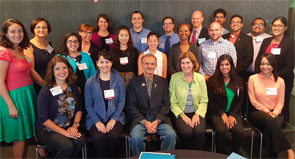This has been a year of tremendous growth, change and achievement for the ACR, and I have been fortunate to lead the ACR in these endeavors. The ACR and ARHP, including the ACR Executive Committee, the ACR Board of Directors, standing and special committee chairs and hundreds of dedicated volunteers, have contributed to this growth and achievement with incredible skill, enthusiasm and foresight. As I reflect on my experience as president, I would like to share with you what is happening at the ACR and how it is Advancing Rheumatology!
Achieving New Heights with RISE: Harnessing Big Data
For several years, the ACR has been investing in the Rheumatology Informatics System for Effectiveness (RISE) Registry. RISE extracts rheumatology patient data from the electronic health record (EHR) of a given practice (e.g., diagnosis, medication, disease activity and other clinical information). The data are passively collected.
Quality measures, particularly those developed by the Committee on Quality of Care (QOC), are built into RISE. Because RISE is a federally approved Qualified Clinical Data Registry (QCDR), it fulfills many of the quality metrics required by MACRA (Medicare Access and CHIP Reauthorization Act of 2015) and will simplify MACRA reporting requirements for practices connected to RISE. As of the end of September, RISE was connected to 117 practices and 472 providers, and has accumulated more than 3 million patient encounters, including more than 1 million visits attributable to patients with RA.
The Committee on Registries and Health Information Technology (RHIT) has worked tirelessly to create RISE, and although many volunteers have contributed, I want to acknowledge Dino Kazi, MD, and Jinoos Yazdany, MD, as well as Rachel Myslinski (ACR staff), for their above-and-beyond efforts to make this registry a reality. The RISE team is currently streamlining the data analytic process and will be ready to accept research queries in the first half of 2017.
RISE has vast potential as a limitless source of valuable clinical data that can inform by computational analysis to reveal patterns, trends and associations. In this way, not only does RISE help individual practices and providers review their own data and benchmark them to regional and national standards, RISE can also help health policy researchers assess healthcare delivery. Ultimately, RISE will help improve the care of individual patients and the rheumatology population as a whole.
The RISE team is currently streamlining the data analytic process & will be ready to accept research queries in the first half of 2017.
Advocacy
The steady stream of government policies and proposals, most especially MACRA, biosimilars and the Part B demonstration project, has kept ACR/ARHP volunteers very busy with advocacy. We have invested in lobbying activities for regulatory advocacy to complement our ongoing legislative lobbying activities, which has really helped us navigate this demanding territory.
We have met with legislators and have communicated with letters and visits to the Centers for Medicare & Medicaid Services (CMS), identifying problems with MACRA and the Part B project for rheumatologists in practice, both in the timing of the rollout and other key concerns expressed by ACR Committees. ACR/ARHP members have sent thousands of messages to lawmakers on these issues through the Legislative Action Center.
The Committee on Rheumatology Care (CORC), the Committee on Government Affairs (GAC) and the RheumPAC Committee have been tireless in their rapid response to these challenges, and I want to personally acknowledge the time and effort by Will Harvey, MD, MSc, Angus Worthing, MD, Doug White, MD, PhD, and Harry Gewanter, MD, who have helped us make sure that we manage these issues effectively. Most especially, I want to thank Adam Cooper (ACR staff), whose gentle but determined efforts have accomplished more than one person can possibly do.
These efforts have paid off: The CMS recently announced some flexibility in options for rheumatologists around MACRA requirements.
The ACR has also sent letters to the FDA, has communicated directly with Janet Woodcock, MD, and has published a position paper on biosimilars that emphasizes that the naming of drugs, switching of biologics and the tracking of any safety signals of the new drugs need to ensure patient safety and patient flexibility. These efforts have been effective in getting the FDA to change some of its initial plans for the naming of biosimilars.
Additional GAC activities include ACR Advocacy 101. In collaboration with the Committee on Rheumatology Training and Workforce Issues (COTW), rheumatology fellows are invited to join ACR/ARHP volunteers and their patients on Capitol Hill each September for the Advocates for Arthritis fly-in. This has been a resounding success and has been an opportunity to recruit new volunteers into ACR activities. The ACR’s advocacy efforts are active at the state level as well, through partnerships with coalitions and with 40 active affiliate societies. This state-by-state advocacy is critical, because biosimilar substitution is state regulated, as are insurance policies, which are usually state or region specific.
Practice Management
Because most of the new government policies and legislation have a direct impact on clinical practice, much of the work of the GAC has been in collaboration with CORC. In addition to the aforementioned activities, CORC has issued position papers on Complementary and Alternative Medicine for Rheumatic Diseases and Screening for Hydroxychloroquine Retinopathy. CORC’s position papers are a treasure trove of gems on up-to-date medical care that can help fight insurance company denials, etc. I urge you to review these when you are deliberating on care for your patients or the CARE package for Maintenance of Certification (MOC). Speaking of MOC …
Education
The ACR, through the Committee on Education, has been in deliberations with other internal medicine societies and has been vocal in expressing concern about the current ABIM Maintenance of Certification (MOC) program requirements. Our volunteers have been in meetings with ABIM leadership to convey the burden that the current MOC program has on rheumatologists, and the threat to our workforce. As a result, the ABIM has announced plans to replace the 10-year secure exam with more frequent, at-home testing options, although the high-stakes nature of the testing remains. We are expecting details of the alternative assessments to be announced late November 2016. I want to especially think Carol Langford, MD, for her many years of expertise managing MOC issues.
Training & Workforce Issues
The COTW is a nexus for many important College initiatives, including workforce assessment. The results of the ACR 2015 Workforce Study will be presented at the ACR/ARHP Annual Meeting in Washington, D.C. By any measure, the conclusions from the study are alarming.
Our workforce supply is predicted to be inadequate for demand in 2020 and 2025. The study predicts a waning supply of rheumatologists (by clinical FTE), exacerbated by rising numbers of patients with rheumatic diseases, retiring baby boomers and more women and millennials in the workforce, who have an anticipated lower productivity due to other priorities that compete for their time.
The COTW is addressing the Workforce Study results in a multiphase plan, including working with the Rheumatology Research Foundation and ARHP to increase rheumatology fellowship funding and accelerate specialized NP/PA rheumatology training for rheumatology health professionals. I want to especially thank Daniel Battafarano, DO, and Seetha Monrad, MD, along with Kamilah Lewis (ACR staff), who invested many hours of effort to ensure the Workforce Study was all encompassing with sound methodology and principles. The COTW has also been involved in the expansion of the global training and workforce as further described below.
Global Outreach
The ACR continues to recognize its leadership role in rheumatology internationally. I have enjoyed being the ACR ambassador to our international colleagues this year. Having visited many national and international meetings this year, I can assure you the ACR/ARHP Annual Meeting remains the premier scientific educational meeting in the world, bringing together scientists, clinicians and ideas to Advance Rheumatology! I want to thank Richard Loeser, MD, and all the AMPC for their tireless efforts this year in organizing this meeting, as well as Lucy Killgore, Ron Olejko, Stacey Chandler and Donna Hoyne (ACR staff), who make the ACR/ARHP Annual Meeting the great international congress that it is. Soon, our new Learning Management System will be the central hub for ACR online education and will disseminate new scientific discovery to rheumatologists worldwide.
But science is more than an annual meeting or online education; the ACR has been the medium for facilitating international scientific collaboration as well. The ACR/EULAR (European League Against Rheumatism) Exchange has been successful in bringing junior scientists together to facilitate scientific exchange and initiating international relationships among investigators. This year, the ACR launched exchange programs with PANLAR (Pan American League of Associations for Rheumatology) and IRA (Indian Rheumatology Association) to bring recently minted rheumatologists to the U.S. to spend a month at a host institution and attend the ACR/ARHP Annual Meeting. These collaborations benefit our domestic members by enriching rheumatology science in the U.S. and facilitating export of our educational resources.
I want to thank Sharad Lakhanpal, MD, Kris Lohr, MD, and Anne Bass, MD, for helping making this exchange program a reality. I hope it continues to be strengthened and expanded in the future.
Communications & Marketing

ACR FIT members who attended Advocacy 101, with ACR/ARHP President Joan Von Feldt (seated, green jacket) and President-Elect Sharad Lakhanpal (seated, with bent fork pin on his jacket).
And speaking of global initiatives, our Simple Tasks Awareness campaign has been embraced by other countries and officially adopted by the British Society of Rheumatology and APLAR (Asia Pacific League of Associations for Rheumatology). The Committee on Communications and Marketing (CMC) strives to disseminate up-to-date information for our members through The Rheumatologist and more streamlined and targeted emails, such as ACR@Work and eNewsRheum. The CMC, which Kelly Weselman, MD, chairs, and Joan Roth (ACR staff) have applied creative solutions to bring about innovative communications for our members. Give us feedback on our efforts.
Treatment Guidelines, Criteria & Quality Measures Development
The Quality of Care Committee (QOC) activities have had exponential growth. ACR guideline, criteria and quality measure development is subject to strict policies to ensure minimal conflict of interest, and these ACR products are recognized worldwide. ACR guidelines include evidence-based recommendations that are rigorously developed using the Grading of Recommendations Assessment, Development and Evaluation (GRADE) methodology. To ensure the guidelines remain up to date and to more efficiently produce and disseminate treatment guidelines, the ACR has brought oversight of the literature review and guideline development activities in house. Although requiring significant investment, once guidelines are able to be updated on a more regular basis, the payoffs will be realized.
This year, QOC activities included completion of final papers for joint ACR/EULAR Sjögren’s classification criteria, myositis classification criteria, myositis response criteria, a new glucocorticoid-induced osteoporosis (GIOP) guideline and a joint ACR/AAHKS (American Association of Hip and Knee Surgeons) guideline focused on the perioperative management of rheumatic disease medications in people undergoing total hip or knee arthroplasty.
In addition, QOC focuses on the development, maintenance and use of quality measures in rheumatology. Quality measures are often used to define value in our specialty and assess the process and outcome of rheumatologic care, and they are key components in the MACRA incentive payment system, so it’s important that the ACR’s voice be heard in discussions about how and where measures are used. The QOC works with CORC to ensure this happens.
Although numerous volunteers have contributed to the incredible productivity of the QOC, I want to especially thank Liana Fraenkel, MD, and Lisa Suter, MD, as well as Amy Miller (ACR staff).
Our guidelines and criteria are disseminated through our journals, Arthritis & Rheumatology and Arthritis Care & Research. These publications continue to disseminate the finest basic and clinical research. Their international status is something about which all of our members should be proud.
The results of the ACR 2015 Workforce Study will be presented at the 2016 ACR/ARHP Annual Meeting in Washington, D.C.
Conclusion
In summary, this has been a wonderful year. The ACR has had numerous accomplishments due to the dedication and commitment of many people. Our leadership taskforce has implemented numerous changes to continue to recruit vibrant, diverse volunteers and leaders with the right skills to continue our success into the future. If you already volunteer, a big thank you. If you haven’t yet, I hope you consider getting involved with one of the many activities of the ACR.
I have enjoyed the privilege of working with so many dedicated volunteers and staff. The outstanding Executive Committee, including Dr. Lakhanpal, Eric Matteson, MD, Elizabeth Schlenk, PhD, RN, David Daikh, MD, PhD, Paula Marchetta, MD, MBA, Abby Abelson, MD, and Afton Hassett, PsyD, has been critical for having many thought exercises in addressing the challenges of the year. The Board of Directors and committee chairs are a diverse group of excellent thinkers who reliably make sound decisions that affect the future of the ACR. I deeply appreciate their support and dedication.
Those of you who have volunteered for the ACR know the staff are the true engines of the organization, and their dedication and insight are critical to the success of the ACR. Under Mark Andrejeski’s leadership, the ACR always manages to reach new heights of achievement. I am grateful for the guidance and friendship of Mark and his senior staff. A shout-out to Julie Anderson, who organizes the Executive Committee in extraordinary ways and whose help and friendship have been critical to my success (and sanity) this year.
Thank you for allowing me to serve you this year. Change is inevitable, and with your help, the ACR will continue to remain the organization that best Advances Rheumatology!
 Joan M. Von Feldt, MD, MSEd, FACR, FACP, is president of the ACR and a professor of medicine at the Perelman School of Medicine at the University of Pennsylvania. She is also staff physician at the Philadelphia VA Medical Center.
Joan M. Von Feldt, MD, MSEd, FACR, FACP, is president of the ACR and a professor of medicine at the Perelman School of Medicine at the University of Pennsylvania. She is also staff physician at the Philadelphia VA Medical Center.


